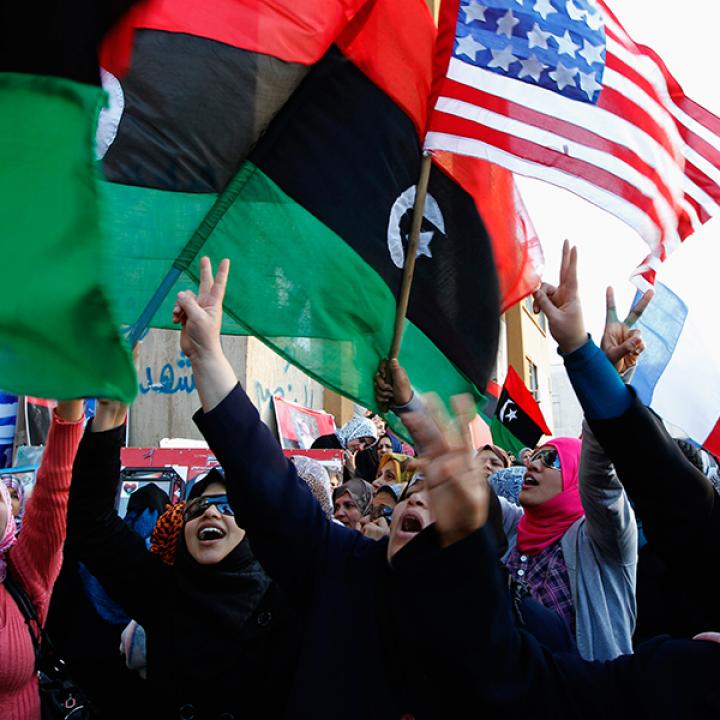
- Policy Analysis
- Articles & Op-Eds
New Evidence on Ansar al-Sharia in Libya Training Camps

Leaked videos show that although ASL's public image has been tied to its missionary work in recent months, the group is also still active in training individuals to fight in Syria.
Over the past few years there have rumblings about training camps in Libya that are run by jihadi entities such as al-Qaeda in the Islamic Maghrib in southern Libya as well as ones by Ansar al-Sharia in Libya (ASL), the organization most likely responsible for the attack on the US Consulate in Benghazi last September. It has been difficult to confirm these camps due to the secretive nature of these groups and the lack of self-reported evidence by these groups. For the first time, though, on August 6, credible sources within Libya confirmed such camps exist.
On Facebook, Moaoya EL Wrffli posted two videos of two separate Tunisians that had been detained by locals in the Darnah region and later interrogated. The two videos below provide fascinating insights into Ansar al-Sharia in Libya and its non-publicized activities as well as facilitation networks in relation to the war in Syria. Based on the information given in these videos, even though they were just posted online, it is likely that they are from late spring/early summer 2012, highlighting that ASL was already at that point very active in training fighters for Syria as well as other likely nefarious activities in light of what we know would eventually happen in Benghazi on September 11, 2012.
FIRST DETAINEE
The first individual mentions that his name is Usama al-Jufayr and admits that he is of Tunisian descent. He says he entered Benghazi in May 2012 for the purpose of training to fight in Syria. He also states that the group running these camps is Katibat Ansar al-Sharia, which was the name used by ASL prior to the consulate attack and only changed afterwards for rebranding purposes. The detainee claims that the regime in Tunisia needs reform, but the set-up in Libya is "al-hamdullilah," suggesting good or permissive to the activities they are undertaking. It is likely that al-Jufayr is indeed a jihadi because he notes that parliamentary systems are contrary to the Islamic sharia, which in his eyes is the only acceptable system of governance. Further, he notes that those training with him had not been involved in military jihad previously and come from civilian backgrounds. The program takes twenty days and at that point only included weapons training and no religious schooling.
SECOND DETAINEE
The second individual does not give his name, but claims he is Tunisian as well. This man entered Benghazi by plane on April 20, 2012, and also joined the ASL camp in Benghazi. He notes that it is more like army training than police training. He also highlights that he was recruited to this camp by a man named 'Abd al-Rahman from Tunis and had previously not known about it. Unlike al-Jufayr, the second detainee suggests that there are other types of training, noting that he had been involved with learning guerilla warfare, booby traps, and surprise attacks. This training was supposed to last for about a month. In the end, his goal was to go to Syria and fight with the Free Syrian Army, illustrating that he might not be a jihadi and wanted to join up for more altruistic reasons, though it is impossible to know for sure.
These two videos show that although ASL's public image has been tied to its dawa (missionary work) over the past eleven months, it is likely that the group is also still active in training individuals to fight in Syria. Moreover, it shows in the case of the second detainee that there are active facilitation networks between recruiters in Tunisia and training camps to get fighters prepared for Syria before they head off to the front lines. These two videos likely only scratch the surface. While some might be skeptical of the videos based on the level of detail and what we generally know about how these groups and networks operate, I am confident that they are legitimate. That being said, more information is definitely needed to fill gaps in what we know about all these types of activities. Hopefully, this is the first of other leaks that uncover more information related to the nexus of these jihadi recruitment and facilitation networks.
Aaron Y. Zelin is the Richard Borow fellow at The Washington Institute. He would like to thank research assistant Adam Heffez for helping with some of the translations.
Al-Wasat


